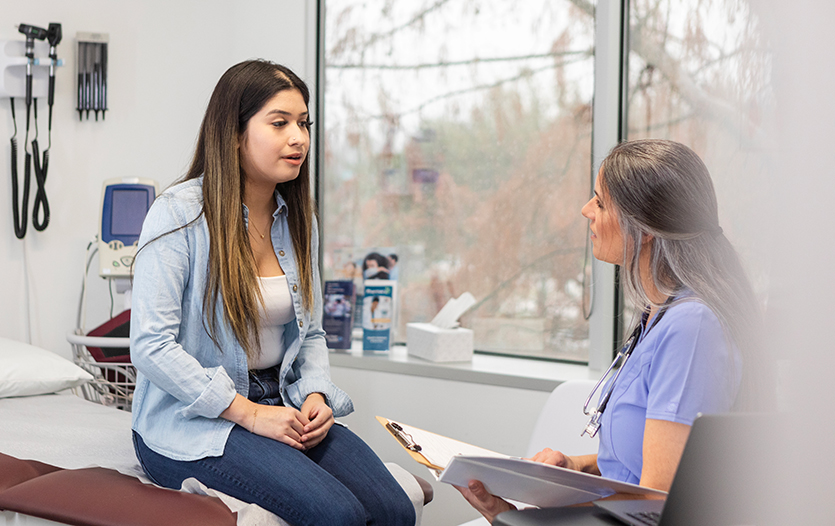
This post was written by Breck Hunnicutt, NP, High Risk and Cancer Risk Reduction Clinic, Parkview Packnett Family Cancer Institute.
Li-Fraumeni Syndrome, thought to occur in 1 in 5,000 to 1 in 20,000 families in the United States, is an inherited condition that increases a person’s risk of various cancers. It is often diagnosed at an early age and can result in more than one cancer diagnosis in a lifetime.
Cause
The TP53 acts as a tumor suppressor that keeps cell division in check and prevents cells from dividing too fast or uncontrolled. When the DNA in a cell becomes damaged for any reason, TP53 has a critical role in determining whether the DNA gets repaired or if it will self-destruct. Then it activates other genes to fix the damage. By preventing damaged cells from dividing, this gene helps to inhibit the development of many cancers. The TP53 gene’s nickname is the “guardian of the genome.” When a person has Li-Fraumeni Syndrome, they experience detrimental changes in the TP53 gene.
Inheritance
Li-Fraumeni Syndrome is inherited in an autosomal dominant pattern, meaning only one copy of an altered TP53 gene is needed to cause this genetic condition. Each person has two copies of the TP53 gene, with one copy inherited from each parent. A person with Li-Fraumeni Syndrome has a 50% chance of passing this gene mutation to each child. However, not every person with Li-Fraumeni Syndrome develops cancer.
Genetic testing
Someone should consider having genetic testing done if there is a family history of Li-Fraumeni Syndrome. Other reasons for genetic testing can include:
- A personal history of sarcoma before age 45
- A first-degree relative with any cancer diagnosis before age 45
- A first or second-degree relative with cancer before age 45 or sarcoma at any age (all on the same side of the family)
- A personal history of soft tissue sarcoma, osteosarcoma, brain tumor, breast cancer, or adrenocortical carcinoma before age 46
- At least one first or second-degree relative with a cancer mentioned above
- A personal history of multiple cancers, which include soft tissue sarcoma, osteosarcoma, brain tumor, breast cancer or adrenocortical carcinoma, with at least one occurring before age 46
- A personal history of adrenocortical carcinoma, choroid plexus carcinoma or rhabdomyosarcoma at any age
- Breast cancer before age 31
Tumor testing may be warranted if assessments reveal a likely pathogenic TP53 gene. Your provider may also recommend genetic testing to look for changes in the genes, which could provide information about the presence of Li-Fraumeni Syndrome. Providers can accomplish this through blood or saliva samples.
Cancers associated with Li-Fraumeni Syndrome
Individuals with Li-Fraumeni Syndrome are at an increased risk of developing various cancers at a younger age, including:
- Acute leukemia
- Adrenocortical cancer
- Breast cancer
- Brain cancer
- Colon cancer
- Gastric cancer
- Pancreatic cancer
- Sarcoma (soft tissue and osteosarcoma)
Other cancers associated with the condition could include:
- Lung cancer
- Melanoma
- Kidney cancer
- Thyroid cancer
- Ovarian cancer
- Testicular cancer
- Prostate cancer
The cancer risk in Li-Fraumeni is not limited to the cancers mentioned above. The TP53 gene plays a significant part in reducing all cancer since this gene initiates DNA repair. But, providers must also consider the various cancers present in an individual’s family history when developing a screening plan.
Management of Li-Fraumeni Syndrome
Individuals with Li-Fraumeni Syndrome will receive a personalized screening and treatment plan tailored to their specific needs. A patient’s cancer screening plan could include any of the following:
- Breast cancer screening: Breast imaging typically begins at age 20. Enhanced breast screening may occur with every 6-month imaging and could include a mammogram with tomosynthesis, breast ultrasound, breast MRI and/or a contrasted enhanced mammogram. A risk reduction bilateral mastectomy with reconstruction may also be considered by age 30.
- Colon cancer screening: Specialized techniques for colonoscopy help examine the entire colon. This could include high-definition colonoscopy, a narrow band colonoscopy or a chromoendoscopy. These techniques can increase the ability to detect difficult polyps which may be present in people with Li-Fraumeni Syndrome. Depending on their family history, people with Li-Fraumeni typically begin colonoscopy screening at age 25 or earlier, then continue screening every 2-5 years.
- Gastric cancer: An upper endoscopy may help view the entire esophagus, stomach, and the first part of the small intestine, the duodenum. Individuals with Li-Fraumeni syndrome typically begin upper endoscopy screening at age 25 or earlier, depending on their family history, then continue screening every 2-5 years.
- Brain cancer: A brain MRI may be considered annually with a neurological exam every 6-12 twelve months.
- Sarcoma (soft tissue and osteosarcoma): An annual whole-body MRI can help detect sarcomas. If this is unavailable, your provider may recommend a yearly chest, abdomen and pelvis MRI.
- Adrenocortical cancer: An annual whole-body MRI can help detect this cancer. If this is unavailable, your provider may recommend a yearly chest, abdomen and pelvis MRI.
- Pancreatic cancer screening: Providers may utilize an annual endoscopic ultrasound (EUS) or MRI/MRCP for patients with at least one first or second-degree relative with pancreatic cancer.
- Melanoma screening: Providers may consider an annual skin screening.
Other considerations in the management of Li-Fraumeni
- Avoid radiation therapy if possible.
- Try to minimize diagnostic radiation as much as possible without sacrificing accuracy.
- Any additional screening should be based on an individual’s family history.
- People with Li-Fraumeni Syndrome must be educated on the signs and symptoms of at-risk cancers and provided psychosocial and quality of life support.
For more information about Li-Fraumeni Syndrome or if you are concerned about your risk factors, contact the Parkview Packnett Family Cancer Institute, or call the High Risk and Cancer Risk Reduction Clinic at 833-724-8326 to schedule an appointment.




